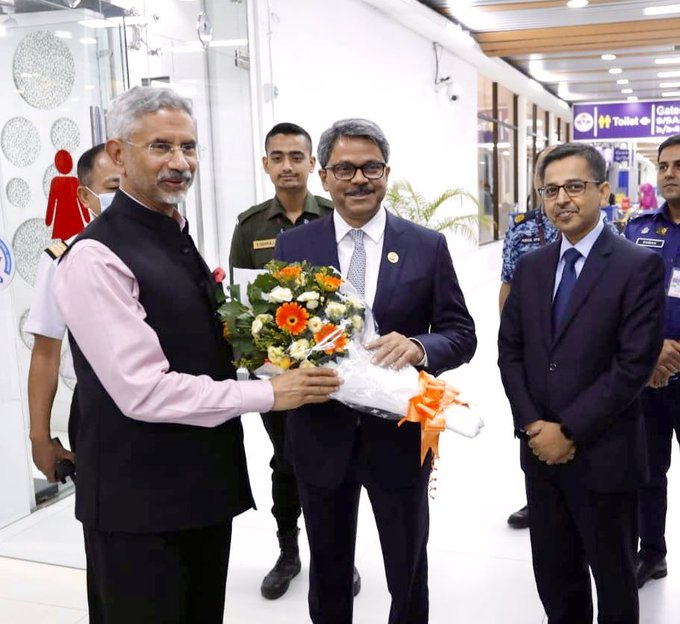The 6th Indian Ocean Conference took place on the 12th and 13th May in Dhaka, Bangladesh. As the current chair of the Indian Ocean Rim Association, Bangladesh hosted the event and Bangladeshi Prime Minister, Sheikh Hasina, inaugurated it.
The Conference was started in 2016- having being previously hosted in countries like Singapore, Sri Lanka and Vietnam- and has since then become an important platform for all the countries in the Indian Ocean Region to come together, consult and cooperate with one another to ensure peace, prosperity and stability in the region. In fact, it has become instrumental in the implementation of India’s Security And Growth for All in the Region (SAGAR) initiative. The theme of the conference this year was “Peace, Prosperity and Partnership for a Resilient Future,” and it was attended by guests from 25 countries.
The strategic importance of the Indian Ocean cannot be stressed upon enough. Its trade routes have been facilitating the flow of goods, people and ideas between the areas of Asia- pacific and North Atlantic since ancient times. It retains its position of eminence today as an important trade route that has a major portion of the world’s crude oil supply passing through it. The Indian Ocean Region (IOR) is also rich in mineral resources as well as a massive drainage basin that is home to some of the fastest growing economies in the world as well as a large chunk of the world’s population. This region is brimful of potential and greater regional integration can transform this region, turning it into a thriving economic hub.
It is, however, this very inability to cooperate effectively with each other as well as the inability to put broader regional and global interests before narrow national interests, that has resulted in the IOR facing security threats from non-state actors such as smugglers, pirates and terrorists.
The Indian Ocean of course has great strategic significance for India, which is the most populous state and one of the biggest powers in the IOR. India has 7500 Km of its coastline in the Indian Ocean and is dependent on it for energy imports through the Indian Ocean route, which is why India has a major stake in the security and development of the IOR. India also realizes that it cannot achieve this vision of a secure and stable Indian Ocean on its own and has been seeking to enhance cooperation and connectivity amongst the states in the region.
In fact, the SAGAR initiative, which serves as India’s policy towards the Indian Ocean, was introduced, just like the Indian Ocean Conference, in 2016, and aims at ensuring the maritime security of the states of the IOR. At the same time, it also promoted economic partnerships as well as collaboration in matters of tourism, infrastructural development and laying the groundwork for sustainable development in the region.
The Indian Ocean Conference thus has become a major facilitator of India’s ambitions regarding the IOR. This was evident during India’s external affairs minister, S. Jaishankar’s keynote address at the conference, where he stressed on the need for enhanced connectivity in the region and the restoration of ancient links between the countries of the region that had been disrupted by imperialism. He talked about the importance of India developing land connectivity with South East Asia and multi-modal connectivity with the Gulf and Central Asian countries. He also emphasised that India is prioritizing connectivity with ASEAN, as that, in his words, “will be a game changer.” Further on in the speech, he said that ensuring maritime security is a shared responsibility and it would require all the countries in the region to exchange information and cooperate with one another for coastal surveillance and collaborating on Maritime domain awareness (MDA).
Speaking at the inaugural session of the 6th Indian Ocean Conference in Dhaka, Bangladesh. https://t.co/n1yWnAAPry
— Dr. S. Jaishankar (Modi Ka Parivar) (@DrSJaishankar) May 12, 2023
Most importantly however, Jaishankar stressed on the significance of the Indian Ocean as a central component of the Indo-Pacific region and therefore the challenges being faced by IOR countries cannot be undermined and needs to be dealt with properly, if the vision of a free and inclusive Indo-Pacific is to become a reality. This was reiterated by author, leading South Asian strategic analyst and founder of StratNews Global, Nitin Gokhale, who was a guest at the 2 day conference in Dhaka.
Gokhale told India Narrative that the Indian Ocean is the “epicenter of Indo-Pacific” and any policy regarding the Indo-Pacific will necessarily include the Indian Ocean because it provides opportunities for outreach to Africa on one hand and South East Asia on the other, thereby facilitating the integration of the Indo-Pacific. Further, speaking on the significance of Bangladesh hosting the event, and it’s importance in the overall Indo-pacific, Gokhale said that considering the fact that Bangladesh is “the epicenter of the epicenter (the Indian Ocean), it is but natural that Bangladesh should host the Indian Ocean Conference.”
Connectivity, prosperity & discouraging opaque lending practices…@nitingokhale gets the key takeaways from the 6th Indian Ocean Conference in Dhaka.@indfoundation #IOC2023 pic.twitter.com/hKqfciF5DZ
— StratNewsGlobal (@StratNewsGlobal) May 13, 2023
He also pointed out that having released its Indo-Pacific Outlook last month, Bangladesh has sought to take center stage in supporting a peaceful and inclusive Indo-Pacific for all and can in fact be instrumental for outreach to the pacific as well as the Indian Ocean.
Also Read: Japan-Bangladesh partnership yielding new Indo-Pacific doctrine to counter China




















